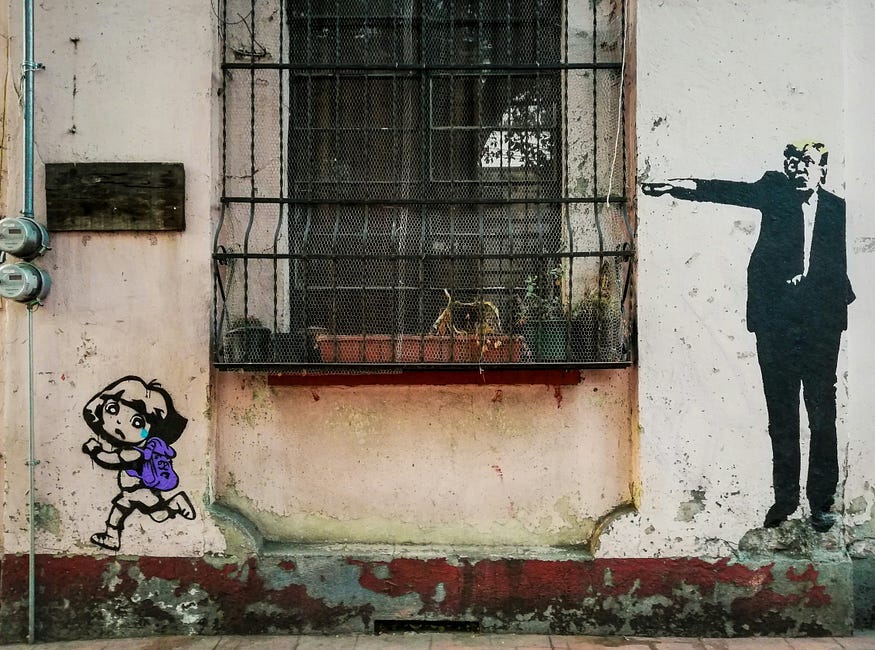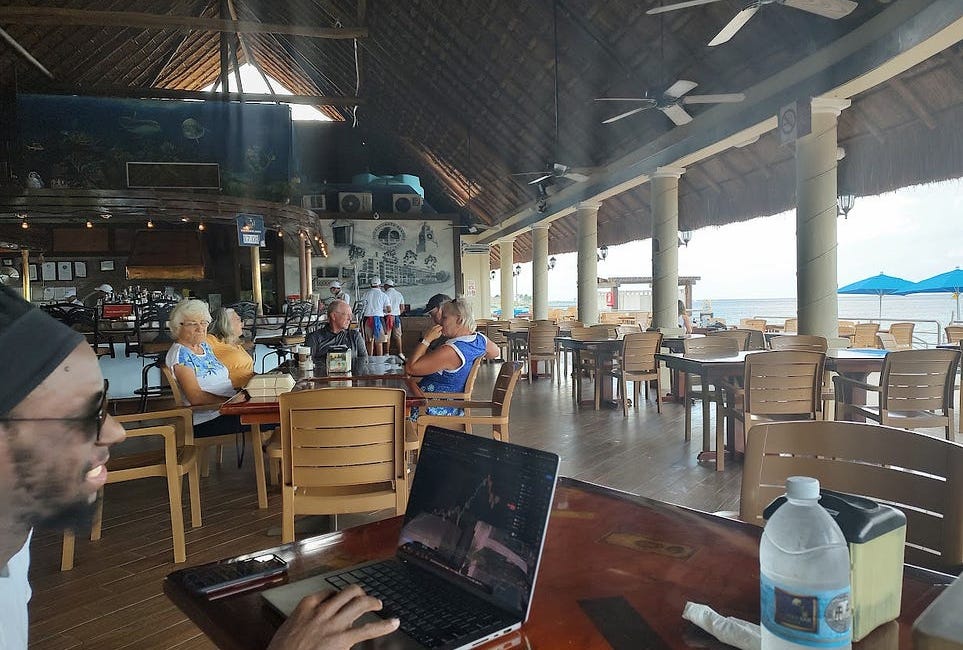The One Approach to Escaping the US That Can Help You Find Your Zen
Conscientious Emigration’s™ emotional regulation superpowers
Author’s photo. Description: My husband Deevon Wes La Rue finding his Zen in a low-impact, nature-worshipping trip to the beach. Accompanied by Tito, the best dog in the world.
Originally published on Medium. Medium members, please go clap it up - I might earn a whole dollar (yes, I am throwing shade at Medium).
Author’s note: a friend in the US - someone whose identities are absolutely targets and who is included in the group of people listed below - told me yesterday she was worried for my mental health based on the many posts I’ve been putting out about the acceleration of the MAGA/Project 2025 agenda.
The strange thing is, I’m good.
I’ve been online and tracking news more lately because
a. it’s the rainy season (which also means it’s the mosquito season) and it’s just relentless, so we haven’t been going out much and
b. I’ve been sick for 10 days now (dengue and flu have been ruled out, and I think I’m on the mend, but it’s hard to tell).
I can see how it may look like I’m fixating.
And maybe I am.
But I also want to note that relative to how I felt when I was actually in the US - especially from 2018 - 2022, I am good.
The reasons for that are multifold, and much of them have to do with not only having emigrated, but the way in which we emigrated.
So, I decided to repost this article, first posted in January, to exemplify how it is I can be reading the US news and speaking up about it, while simultaneously feeling overall emotionally balanced. Being rooted here, but branched there. In particular, when we go out and interact with everyday people here, I feel good (albeit maybe not totally physically).
Even my visits to the immigration office and the doctor yesterday were pick-me-ups. I just watched a huge gecko crawl up the exterior wall outside, and a beautiful bird picking mosquitoes off the screen door.
I’m good. I think it has everything to do with Conscientious Emigration™ (not just emigration). Letting my new home change me. Moving with intention and humility. Gratitude and appreciation.
January 25, 2025
It has been a really rough week, watching as decades of social and environmental progress are aggressively scraped back wholesale.
I am worried about my family members in the US, especially those who are both Black and queer. I’m concerned for my friends, most of whom will be targets for MAGA due to their racialization, their work advancing equity and social justice, or both. Truthfully, I’m concerned about the scores and scores of people I do not know at all — the many, many innocents — who will suffer harm at the hands of this regime and its sycophants.
Projected revenue for our business advising nonprofit organizations on equitable conservation policy, inclusive outdoor recreation, and DEI in the environmental sector has a slim chance of materializing at this point due to the Executive Order attacking DEI and environmental justice contracts with the US federal government. We may very well be looking at cancellation of contracts — money that was supposed to be “in the bag.”
Of course, I have been checking in with and sending information to our Conscientious Emigration clients. In the midst of all of this madness, it brings me a measure of comfort that my clients who have committed to their emigration and are in the midst of executing against their plans have told me they are doing ok, and even feeling empowered by the actions they’re taking.
Last night, after a call with the local environmental organization we volunteer with on Cozumel and reading a few submissions by potential new emigration clients, I lay in bed, allowing my thoughts to arise and observing them.
And I realized how much more deeply capable I have become of regulating negative emotions and moving into a healthy headspace.
This has everything to do with the experience of Conscientious Emigration. I hadn’t put it together before last night, but it emerged like a figure walking out of the mist in my mind.
There is something about emigrating from the US — a toxic environment, point blank — with intentionality around values and ethical behavior, that can enhance our ability to emotionally regulate.
Being able to emotionally regulate is key to making wise decisions, preventing dangerous recklessness, and avoiding harm toward others. Just think about how much violence, revenge, and purely foolish behavior results from the “amygdala hijack” that happens when people’s emotions control them. Some of the most harmful powermongers in the world today are perilous because of their total failure to emotionally regulate.
Pondering all of this led me to the realization that Conscientious Emigration™ is not just about behaving with integrity, but it is also a manner of being in the world that can increase our resilience to the unavoidable challenges of life.
Let me break it down:
Conscientious Emigration™ — an intentional approach to emigrating that asks us to consider our impacts on, move respectfully in, and contribute to our new communities — provides benefits that simply becoming an “expat” does not.
How so, you ask? I’ll tell you:
We enter the positive energy loop.
Approaching people in your new home with respect, humility, and kindness leads to harmonious interactions. Harmonious interactions spur positive feelings — gratitude, joy, connection, even love. Positive feelings are often “felt” by others as “good vibes” (buenas vibras), and those good vibes lead to more harmonious interactions. Those harmonious interactions then feed back into more good feelings, and on we go.
When we are in this positive energy loop, heart-centered, we are more likely to extend more patience, grace, and empathy in our lives. This, in turn, leads to better relationships.
On and on the cycle goes.
Strengthening all of these neural pathways and emotional responses reinforces them, while allowing the old pathways of hypervigilance, reactivity, fear, and anger to rest and eventually, atrophy to a more functional level. Our amygdalas quiet, and don’t come out as often when they aren’t actually needed.
Physical wellness comes more easily.
Just as emotional stress leads to physical ailment, emotional well-being can lead to physical healing. I know this firsthand, as when I worked in a stressful job in which I had to interact and collaborate with sexist, racist men who chronically disrespected me, I developed recurring muscle spasms, acid reflux, gastritis and thyroid issues.
I am almost ten years older than the day I had to rush to urgent care because I could not stop vomiting from gastritis and became severely dehydrated, and I now have none of these problems.
Reduced emotional stress leads to increased physical wellness, which in turn boosts emotional wellness. Feeling better in our bodies inevitably leads to more emotional resilience.
We build positive, healthy, supportive community.
Not all “communities” are equal when it comes to emotional regulation. While it might offer immediate gratification to commiserate over the fights we fight, the traumas we share, our collective frustrations, and our common enemies, this gratification can be easily displaced with an overall pessimism, hopelessness, and bitterness that does not serve us or our community well.
Similarly, “communities” solely based around common habits, origin, language, or geographic proximity can be a crapshoot — you don’t necessarily know what you’re going to get.
By contrast, intentionally forming community around activities that align with conscientious values, we are likely to find more people who are doing the same. It might take time to find our fit, but eventually, there is a strong likelihood that engaging in service work in our new communities will bring us into proximity with people who share our values and lifestyles. For my husband and I, our work on coral restoration and ocean conservation volunteer work has led us into relationships with truly inspiring, fundamentally good people who we are fortunate to now call friends.
(Though we are no longer doing this particular volunteer work for a number of reasons that have nothing to do with corals, we still do our own private cleanups and still have dope values-aligned friends from this experience).
We offset feelings of guilt or shame.
It’s common for people who leave toxic environments, including countries, to feel a sense of “survivor’s guilt” for those left behind. Indeed, there seems to be a concerted effort — including among marginalized people who align with our values — to shame emigrants from the US for not “staying and fighting.”
I maintain that this is truly no one’s business and no one has a right to inflict shame on folks who emigrate, but that won’t stop people from trying. Additionally, for people who have conscientious values, awareness of the proliferation of international gentrification, overdevelopment, overtourism, and patterns of colonialism can lead to feelings of guilt and shame for emigrating.
Guilt and shame can serve as catalysts to help people consider their actions, but they can also be intensely detrimental to our mental health in wholly unproductive ways. By deliberately taking conscientious approaches to the way we enter our new countries and what we do there, we can acknowledge that our emigration may have some negative consequences for others, and that we are doing what we can to mitigate those and balance them with positive impacts.
We may be able to move at a slower pace.
This will vary depending on where we move, but few places are more demanding that we “go, go, go” than the US.
The memes about European out-of-office messages are a perfect example of the different values around work, family, and recreation.
My experience and observation in Mexico is that hard work and long hours are common and valorized, and working conditions can be subpar, yet I see working people smile and laugh more. Delays in timelines are not cause to have a heart attack. I almost never see people rushing around like the proverbial headless chicken, full of self-important seriousness and angst. It carries a much different energy.
Added to that, time with family is definitely prioritized (especially on Sundays) and holidays are virtually sacrosanct (including Carnivale). Granted, we live in the Mexican Riviera, and cultural norms vary throughout the enormous country — friends from Northern Mexico have told me that people are more direct, terse, and “rough” there, and folks from Mexico City have a reputation of being more elitist.
All of this will vary — microcultures exist everywhere, as they do in the US. Chances are, however, that emigrating intentionally may provide an opportunity to lean into cultural norms that encourage you to slow down. Conscientiously emigrating asks us to adapt to this change, to allow ourselves to be changed by it, rather than frustrate ourselves with vain attempts to impose our cultural standards and expectations in ways that serve no one, including us.
We will be more mentally stimulated and emotionally expansive.
Certain aspects of conscientiously emigrating simply build a more interesting experience of life. Learning and improving upon a new language, observing unfamiliar cultural phenomena, studying the history of our new homes, enjoying locally-made foods and adopting new ways of being that honor the community norms of our new homes help us grow.
Being regularly fascinated and challenged to engage our minds and senses helps us to “zoom out” from the monologues in our heads. Having interesting things to do or simply ponder helps us to counteract some of the unnecessary stress and the staleness of routine — the “same sh*t, different day”ness that can often characterize a life lived in one place. In this context, it is much easier to let go of the little things that bother us, because there is just so much more to think about.
To be clear, emigrating is not for everyone. Stories about people who moved to other countries only to struggle with disappointment and frustration and return to the US pop up regularly.
There is a certain level of adaptability and perspective required to adapt to an entirely new culture. That adaptability and perspective may also be more available to those of us who left the US due to discrimination and fear for our safety — sometimes, no matter how challenging a new country might be, one knows that the pale shade of green on which they walk tenuously will always be better than the proverbial barren, garbage-strewn asphalt that they left behind in the US.
My belief, bolstered by my experience, is that no matter what one is leaving behind in the US, approaching emigration conscientiously will augment the experience of the emigrant as well as the way our new homes experience us.
In this harmony, we find a level of emotional resilience and opportunities to practice and strengthen emotional regulation. In all respects, this can lead us to a more peaceful and positive experience of life.
With the US provoking chaos and conflict at levels most of us have never experienced before, more peace and positivity is something everyone can use right now.
If you’re considering emigrating from the US with an intentional approach to your environmental, economic and cultural impacts, see our services, check out our client testimonials, and fill out a screening form.
©2025 Silleck Consulting Services, LLC. All rights reserved. No AI tools were used to write this article, solo mi cerebro.
How To Avoid Being An “Ugly American”
Photo by author. This group of US-ers conspicuously glaring at us and talking smack about the fact that my husband and I were working at this restaurant, as if our efforts to earn a living were a per…





Thanks for sharing your observations. I hadn’t really been able to put my finger on why I’m so exhausted, and why I haven’t felt like “creating.” I hope to continue my retirement, with however many years I’ll have, creating new community and art, in my chosen country. I feel like I’m just treading water, and while I do have friend and family support for the next phase, my summer of overwhelm created some rifts I’m still repairing. I do truly think I’ll be able to breathe once I arrive in my new country, that hasn’t felt possible for so long.
One of the very first Mexican phrases I learned as a teenager in the 90s was "buena onda." Literally translated it means "good waves," but I always understood it to mean good vibes, like you describe.